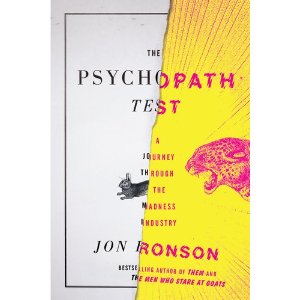
Jon Ronson
‘People who are psychopathic prey ruthlessly on others using charm, deceit, violence or other methods that allow them to get what they want. The symptoms of psychopathy include: lack of a conscience or sense of guilt, lack of empathy, egocentricity, pathological lying, repeated violations of social norms, disregard for the law, shallow emotions, and a history of victimizing others.'
– Robert Hare, Ph.D
I've been hooked on Jon Ronson's writing since ‘The Men Who Stare at Goats' was first published. Ronson cuts right to the heart of important topics by having the guts to ask the difficult questions. His literary style is equal parts journalistic rigour, deep compassion and incisive observational humour that often shines the light of ridicule on darker human behaviours. ‘The Psychopath Test' explores psychiatry, psychopathology, medication and incarceration of ‘dangerous' individuals. The book reads like a mystery novel, which – driven by Ronson's compelling prose – makes it difficult to put down.
The story begins with a meeting between Ronson and a history student who has received a cryptic book called ‘Being or Nothingness' in the mail. The same book has been received by several individuals around the globe, most of whom work in the field of psychiatry. The book contains 42 pages, every second one blank. (This made me wonder…in ‘The Hitch-hiker's Guide to the Galaxy', the ultimate answer to life, the Universe and Everything was 42. Was this relevant? Was the mysterious author of ‘Being or Nothingness' implying that his cryptic messages, if decoded, could lead to enlightenment?)
Ronson's journey leads him to ‘Tony' in Broadmoor, who – when charged with GBH and facing prison 12 years earlier – had faked insanity in the hope of being sent to a comfortable psychiatric hospital. Instead, he had been sent to Broadmoor high-security psychiatric hospital (home to Britain's most dangerous psychotic prisoners), where he was being held indefinitely. Tony explains that he had picked characteristics of various movie lunatics then pieced them together into his ‘insane' persona. Getting into Broadmoor had been easy, but getting out was proving immeasurably harder. A senior psychiatrist admits to knowing that Tony isn't insane, as a truly insane person wouldn't manufacture a new personality in the hope of avoiding prison…but a manipulative psychopath would.
Ronson meets Bob Hare, creator of the PCL-R Test, a 20-step Psychopath Checklist which gives individuals scores between zero and forty; the higher the score, the more psychopathic the person. Hare reveals that inmates at prisons and psychiatric institutions aren't the only ones who score highly on his ‘psychopath test': many CEOs and directors of corporations qualify as psychopaths too. This prompts Ronson to wonder ‘if sometimes the difference between a psychopath in Broadmoor and a psychopath on Wall Street was the luck of being born into a stable, rich family.'
Al Dunlap closed Shubuta's Sunbeam factory (the economic heart of that community), showing no empathy while firing workers and effectively killing the town. While laying off employees, he even spouted jokes such as, “You may have a sports car, but I'll tell you what you don't have. A job!” Bob Hare flags Dunlap as a psychopath, so Ronson sets out to meet the man. When Ronson asks probing questions based on the PCL-R checklist, Dunlap's responses mark him as a textbook psychopath.
Hare explains the science of psychopathology: a part of the brain called the amygdala doesn't function in psychopaths as it does in other human beings. When a regular person experiences extreme violence or carnage (or even photographs of such scenes), his amygdala becomes overstimulated, provoking an extreme anxiety response in the central nervous system. When a psychopath experiences the same stimuli, his amygdala does not respond: no anxiety response occurs. This explains the psychopath's lack of empathy.
‘The Psychopath Test' is a compelling read. Ronson's fluid style is the perfect balance of rigorous research, keen observation, poignancy and humour. Congratulations to Jon Ronson on another phenomenal achievement.




